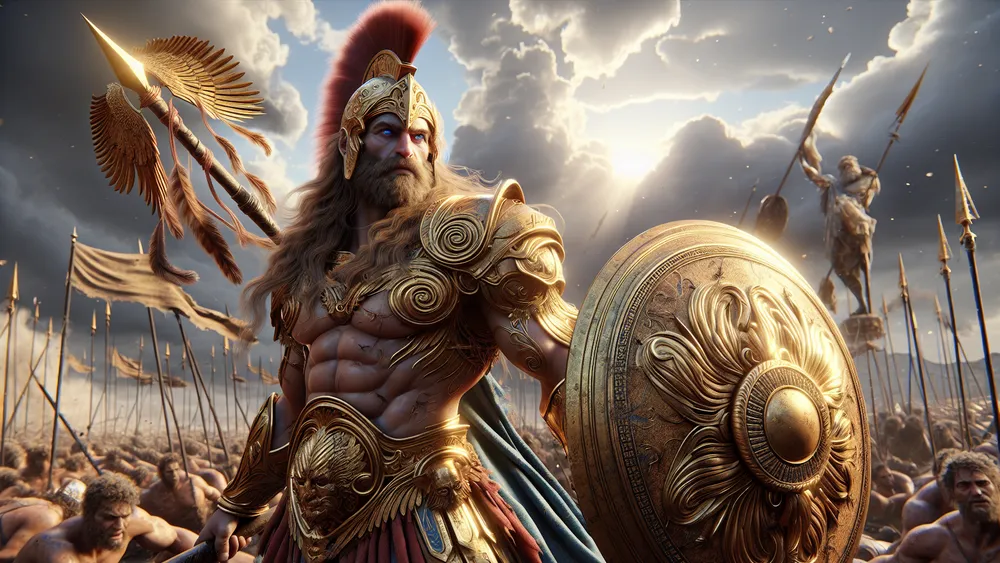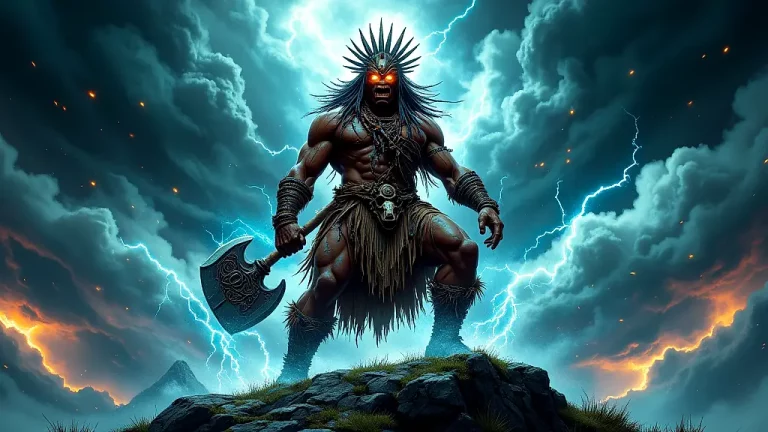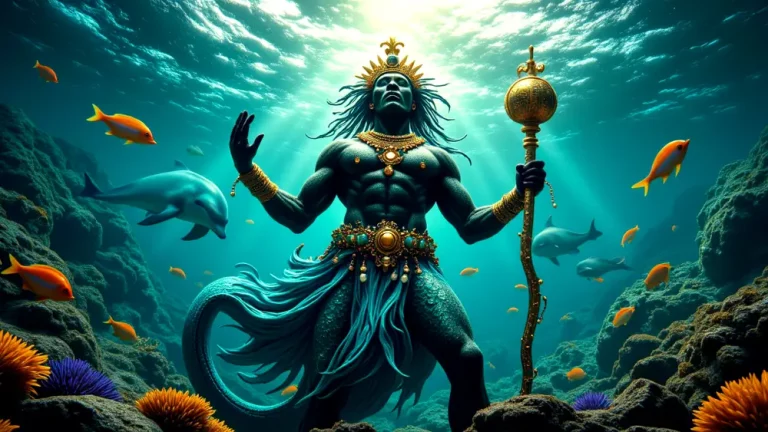Achilles: Greatest Warrior And Hero Of Greek Mythology
When you think of Greek mythology, one of the first names that might pop into your head is Achilles, a legendary warrior whose tale has interested people for many centuries. Picture a hero so strong that his name itself means toughness and almost invincibility, yet his life was defined by one simple but deadly weakness. In this blog post, we will look into the life and legacy of Achilles.
Key Points:
- Achilles is a legendary hero from Greek mythology, known for his almost unbeatable fighting skills.
- He was born to Peleus, a mortal king, and Thetis, a divine sea nymph who tried to make him invincible by dunkin’ him in the River Styx, but his heel stayed vulnerable.
- A prophecy predicted he’d either live a long, boring life or die young but famously, and he chose the latter, leading to his part in the Trojan War.
- During the war, he got mad and stopped fighting when Agamemnon took Briseis, a woman given to Achilles as a prize, but returned to battle after his best friend, Patroclus, was killed by Hector, the Trojan prince.
- Achilles is famous for defeating Hector in a fight, but his life ended when Paris, guided by Apollo, hit his weak heel with an arrow.
- The term Achilles Heel now means a critical weakness in an otherwise strong thing, which comes from the story of how Achilles’ mother held him by his heel when she tried to make him invincible.
- Achilles’ story has had a far-reaching influence, appearing in old and modern literature, art, and media, symbolizing heroism and tragic weakness.
We’ll talk about where he came from, his actions during the Trojan War, and the lasting impact of his story in literature, art, and today’s culture. Whether you’re new to Greek mythology or wishing to learn more, this all-in-one guide will give you a close-up look at one of mythology’s greatest heroes.
Achilles: Overview and Key Facts
| Key Point | Description |
|---|---|
| Name | Achilles |
| Parents | Peleus (mortal king) and Thetis (sea nymph) |
| Birthplace | Phthia in Thessaly |
| Prophecy | Predicated to have a short but high life, dying young in the Trojan War |
| Teacher | Chiron, the wise centaur who trained many Greek heroes |
| Role in Trojan War | Greatest warrior of the Greek forces, a big figure in many important battles |
| Dispute with Agamemnon | Disagreement over Briseis, which led to Achilles stepping away from fighting |
| Close Friend | Patroclus, whose death hit Achilles hard and caused him to come back |
| Well-Known Duel | Fought and killed Hector, the Trojan prince |
| Death | Killed by Paris, whose arrow hit his heel thanks to Apollo |
| Legacy | Symbol of heroism and tragic weakness, has a big impact on literature and art |
| Cultural Impact | Term “Achilles Heel” means a critical weakness despite overall strength |
Getting to Know Achilles
To really understand why Achilles is a legendary status, it’s important to look at his beginnings, his early life, and the main events that had a big impact on his life. First, let’s see who Achilles was and why he is still an important figure in Greek mythology.
Who is Achilles?
Achilles is a famous figure in Greek mythology, known for his great skill as a fighter and his main role in the Trojan War. Think of a hero whose name makes us think he can’t be beaten and is really good at fighting, like how we think of some famous athletes today.
From the start, Achilles was born to Peleus, a mortal king, and Thetis, a sea nymph, where he was destined for greatness. His importance in Greek mythology is huge, as he represents the ideal warrior – brave, strong, and nearly unbeatable, except for the one weak spot he had, his heel.

The things Achilles did, especially during the Trojan War, appear in epic poems like Homer’s “Iliad,” making him stand for both heroism and a sad end.
Achilles, a hero in Greek myths, symbolizes bravery and strength but also vulnerability due to his heel, as seen in stories like Homer’s Iliad.
Early Days and Background
To see Achilles’ journey and his fame, it’s important to see his early life, his parents, and the prediction that decided his future. For a better understanding, let’s take a closer look at the beginnings and early years of this famous hero.
Talk about Achilles’ Parents and Birth
Achilles’ family background is an interesting mix of human and divine traits. His father, Peleus, was a human king of the Myrmidons, who were known for being loyal and having great fighting skills. Think of Peleus as a respected leader, much like a current leader, who was known for being brave and wise.
His mother, Thetis, was a sea nymph, a divine being with powers and beauty that attracted the gods. Thetis’ protective nature can be seen in how some parents really work hard to keep their kids safe. Their union had a grand wedding with gods and humans attending, starting a significant story.

For Achilles’ birth, Thetis, knowing about a prediction that her son would either live a long, quiet life or die young but famously, tried to make him invulnerable by dipping him in the River Styx. But this left his heel – the part she held – vulnerable, which set the stage for what he did in the future and how he ended.
The Prophecy and What It Meant for Achilles
The prophecy about Achilles’ future was an essential part of his life, much like a significant decision that decides one’s path. The prophecy said Achilles would have one of two futures: he could live a long, simple life or get lasting fame but die young. This prophecy greatly affected his early years and his parents’ choices, especially his mother, Thetis.
To protect him, Thetis tried to make him invincible by dipping him in the River Styx, but his heel stayed vulnerable. This act also set the stage for his later fall. Throughout his life, he knew about his two different futures, which made him want fame and heroic deeds, especially during the Trojan War.
Knowing the prophecy also made his actions seem sadly inevitable, as he chose a path leading to his early death but made sure his name would last forever. In the end, the prophecy came true when Achilles got hit in his vulnerable heel by an arrow shot by Paris, guided by Apollo, ending his life and making him legendary.
His Childhood and Training
Achilles’ early years were full of a mix of divine and human influences. After he was born, his mother, Thetis, who knew about a prophecy, tried to keep him safe by making him invincible.
At the same time, his father, Peleus, made sure that Achilles got the best kind of education and training, so Achilles went to study with Chiron, the wise and famous centaur, who knew about many different things. Think of Chiron as a mix of coach, teacher, and doctor, teaching Achilles about medicine, music, and fighting.
Under Chiron’s guidance, Achilles became very strong and skilled as a warrior, getting ready for the great things he would do later. This tough training started Achilles’ later achievements, making him the greatest warrior of his time.
The Trojan War
Because of his special training and the prophecy deciding his future, Achilles’ path surely led him to the huge conflict that would shape his name. Let’s look at his important part in the Trojan War.
What Achilles Did in the Trojan War
Achilles’ part in the Trojan War was known for his great skill on the battlefield, much like a star athlete leading their team. From the start of his time at Troy, he revealed his great fighting skills and clever thinking.

One big thing he did was beat Hector, the Trojan prince and the best warrior of Troy, which made the Trojan soldiers feel bad. Achilles also led many successful attacks against Trojan allies, capturing cities and getting resources for the Greek army.
When he was on the battlefield, it mattered a lot; his mere presence often turned the tide of battle to favor the Greeks. Even though he stopped fighting due to a dispute with Agamemnon, Achilles’ actions were vital in weakening the Trojan defenses and leading to the final Greek win.
Achilles was a key player in the Trojan War, using his exceptional combat skills to greatly impact battles and weaken Trojan defenses, ultimately contributing to the Greek victory.
Why Achilles Got Angry
The fight between Achilles and Agamemnon was like a big argument between a star player and a coach. Achilles got mad when Agamemnon took Briseis, a woman given to Achilles as a prize, to make Apollo happy and gave back Chryseis. This was taken as a huge insult to Achilles’ honor and respect among the Greek warriors.
Feeling deeply disrespected and undervalued, Achilles did not fight and did not let his strong Myrmidon warriors fight either. This meant big problems for the Greeks. They struggled without their best warrior, losing many battles. Achilles not fighting highlighted how important he was to the Greek campaign and led to the huge events later on.
Patroclus’ Death
Patroclus’ death was an important moment in the Trojan War, like losing a close teammate that makes a player want to try harder. Patroclus, Achilles’ closest friend and confidant, put on Achilles’ armor and went into the battle to help the Greek forces because Achilles wasn’t there. However, his courage made him die at the hands of Hector, the Trojan prince.
The news of Patroclus’ death brought deep sadness and anger to Achilles, like he had lost part of himself. This loss broke Achilles’ decision to stay away and made him return to fighting with a new strong desire to avenge his friend.
Patroclus’ death not only made Achilles go back to the battlefield but also changed the war, because Achilles’ anger and the things he did next had big effects for both the Greeks and the Trojans.

The Big Fight with Hector
The big fight between Achilles and Hector was like a highly expected match between two top athletes. The lead-up was intense because Achilles wanted to get back at Hector for Patroclus’ death and Hector was defending Troy. When they met outside Troy, the fight was fierce.
Achilles, who was mad and sad, gave a deadly hit to Hector. After the fight, Achilles disrespected Hector’s body by dragging it behind his chariot. This act shocked both the Greeks and the Trojans. Achilles’ actions showed his unmatched skill and made the hate between the two sides even deeper.
Key events leading up to and following the fight include:
- Patroclus’ death at the hands of Hector.
- Achilles’ decision to return to the battlefield.
- The fight itself, where Achilles killed Hector.
- Achilles’ disrespect of Hector’s body.
- Hector’s body going back to Troy for a proper burial.
The Achilles Heel
After looking at key parts of Achilles’ life and his famous battles, now we should look at one of the most long-lasting parts of his story: the idea of the Achilles Heel.
Where Achilles Heel Comes From and What It Means
The term “Achilles Heel” comes from the legendary story about Achilles’ mother, Thetis. She dipped him into the River Styx to make him cannot be hurt. But she held him by his heel, so that spot stayed dry and weak. This small, important weakness led to Achilles’ death when Paris, guided by Apollo, hit his heel with an arrow.

“Achilles Heel” now means one weak spot in an otherwise strong thing. In modern language and culture, it means a critical weakness in a person, system, or organization. For example, a very good athlete might have an “Achilles Heel” in the form of an injury that happens again, or a powerful company might have a weak spot in its cybersecurity.
Modern examples of the “Achilles Heel” include:
- Literature: The term is often used in books and essays to point out a character’s weakness.
- Film and Television: Many movies and TV shows use the idea to show a main character’s or bad guy’s weakness.
- Sports: Commentators often talk about an athlete’s “Achilles Heel” when talking about a particular weakness that could hurt their performance.
- Technology: In cybersecurity, an “Achilles Heel” might mean a weak spot that hackers can use.
Legacy and Influence
Now that we know the beginning and importance of the “Achilles Heel,” let’s see how Achilles’ mark has spread into books, art, and today’s media.
Achilles in Old Literature
Achilles is one of the most famous people in ancient Greek stories, often shown as a hero with amazing skills and a big flaw, much like a modern superhero. His most famous story is in Homer’s “Iliad,” where he is the best warrior of the Greeks in the Trojan War.
The “Iliad” looks at his anger, his fight with Agamemnon, and his return to battle after his close friend Patroclus dies. Other old poets, like Statius in his long poem “Achilleid,” also looked at other parts of Achilles’ life, including his young years and when he was dressed as a girl on the island of Scyros. These stories have made sure Achilles is a central figure in Greek myths and stories.

Some well-known stories about Achilles include:
- Homer’s “Iliad”: The main source of Achilles’ story, looking at his role in the Trojan War.
- Homer’s “Odyssey”: Mentions Achilles shortly in the underworld.
- Statius’ “Achilleid”: Looks at Achilles’ young life and his time on Scyros.
- Euripides’ “Iphigenia in Aulis”: Shows Achilles’ role before the Trojan War.
- Ovid’s “Metamorphoses”: Includes mentions of Achilles and his great deeds.
Achilles, a prominent figure in ancient Greek tales, is a hero with exceptional skills and a notable flaw, similar to today’s superheroes, appearing prominently in various stories like Homer’s Iliad and other poems that detail his life and adventures.
Achilles in Art and Statues
Achilles has been a popular subject in old art and sculpture, often shown during times of hero-like acts and fights. These artworks express the main idea of Achilles’ strength, bravery, and bad end, much like how modern action figures make last forever famous scenes from popular movies.
From detailed vase paintings to large marble statues, artists have shown Achilles in different ways, focusing on important times from his life, such as his fight with Hector or his weak time at the River Styx. These works celebrate his famous status and also act as proof of the long-lasting interest in his character.
| Artwork Title | Description | Location |
|---|---|---|
| Achilles and Penthesilea | A detailed vase painting showing Achilles’ fight with the Amazon queen. | British Museum, London |
| Achilles and Hector | A marble relief showing the fight between Achilles and Hector. | Louvre Museum, Paris |
| Achilles at the River Styx | A fresco showing Thetis dipping Achilles into the River Styx. | Pompeii, Italy |
| Achilles Wounded | A sculpture showing the moment Achilles is hit in the heel by an arrow. | National Archaeological Museum, Athens |
| Achilles Mourning Patroclus | A vase painting showing Achilles saddened over the body of Patroclus. | Metropolitan Museum of Art, New York |
Achilles in Today’s Media
Achilles’ story has been rethought and changed in many forms of modern media, similar to how old tales get retold in today’s superhero movies. In books, like Madeline Miller’s “The Song of Achilles,” there is a new view on his life and friendships, especially his bond with Patroclus.
The 2004 movie “Troy,” with Brad Pitt as Achilles, brings the exciting story to today’s viewers with a mix of past drama and action. Additionally, Achilles appears in many TV series, video games, and even comic books, where his legendary actions and tragic flaws continue to interest and motivate. These changes both keep his story alive and bring it to new people in interesting and easy ways.
Pantheon of Greek Mythological Heroes and Figures
The group of Greek heroes and figures is like an old team of heroes, each with their special skills, stories, and actions in mythology. From the strong Hercules and his twelve tasks to the smart Odysseus and his long trip home, these figures have grabbed people’s interest for ages.
If you want to check out the whole list of Greek heroes and figures, you can find a detailed list of all the Greek Mythological Heroes and Figures. This detailed list offers full details on each hero and figure, giving a better understanding of their roles and significance in Greek mythology.
FAQs
1. Who were Achilles’ parents?
Achilles’ parents were the mortal king Peleus and the sea nymph Thetis.
2. What was the prophecy about Achilles?
The prophecy about Achilles foretold that he would either live a long, uneventful life or achieve eternal glory but die young in battle.
3. How did Achilles die?
Achilles died when Paris, aided by Apollo, shot an arrow that struck his vulnerable heel.
4. What is the significance of the Achilles Heel?
The significance of the Achilles Heel lies in its representation of a critical vulnerability despite overall strength and invincibility.







